July 26, 2018
Edited by David Sanders
Specimen Days
1680—John Wilmot, 2nd Earl of Rochester, poet/courtier, dies.
1802–Winthrop Mackworth Praed, English politician and poet, born in London, England (d. 1839), is born.
1875—Antonio Machado, Spanish poet (Campos de Castilla), born in Seville, Spain (d. 1939).
1928—Ibn-e-Safi, Pakistani fiction writer and Urdu poet (d. 1980), is born.
1939—Wopko Jensma, South African poet and graphic designer, born in South Africa.
1954—Hans Lodeizen, [Johan Frederik], poet (Travel to Congo), dies at 26.
1959—Manuel Altolaguirre, Spanish poet and publisher (Amor), dies at 54.
1980 —Ibn-e-Safi, Pakistani fiction writer and Urdu poet (b. 1928), dies.
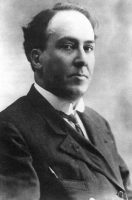
Traveler, there is no road;
you make your own path as you walk.
As you walk, you make your own road,
and when you look back
you see the path
you will never travel again.
Traveler, there is no road;
only a ship's wake on the sea.
—from [Traveler, your footprints] by Antonio Machado, translated by Mary G. Berg and Dennis Maloney
“when you look back / you see the path / you will never travel again.” – Antonio Machado
World Poetry
Murder Case of Salvadoran Poet Roque Dalton's Reopened
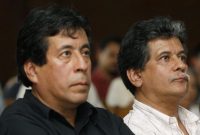
The Supreme Court of Justice in El Salvador has accepted a petition to re-open the murder case of poet Roque Dalton, who was killed in 1975 by his own partners in the Revolutionary People's Army (EPR), accused of being a revisionist, a Cuban agent and collaborating with the CIA. The court accepted a habeas corpus request and ruled that the country's prosecuting office had failed to investigate the kidnapping and murder of Dalton. Now, 43 years later, the case will be finally investigated.
President Nazarbayev Meets with Prominent Poet Olzhas Suleimenov

Head of State Nursultan Nazarbayev has received today well-known Kazakhstani poet, writer Olzhas Suleimenov, Kazinform has learnt the Akorda press service. At the meeting, the sides paid attention to the relevant issues of modern Kazakh literature and its role in the spiritual modernization of the society. Suleimenov shared his creative plans for the upcoming period.
North Korea's ex-Poet Laureate Has a Human-rights Message for Trump
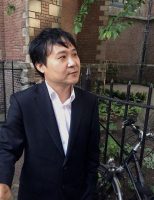
A former senior North Korean official has warned President Donald Trump he cannot just focus on denuclearization but must also deal with Kim Jong Un's human-rights abuses if there is any hope of achieving peace and stability. Jang Jin Sung served as poet laureate to Kim's late father, Kim Jong Il. He describes his former role as a propaganda chief for the regime as a "psychological warfare officer."
The Supreme Court of Justice in El Salvador has accepted a petition to re-open the murder case of poet Roque Dalton.
Recent Reviews
Heather June Gibbons' Poetry Will Make You Put Your Phone Down
by Ingrid Rojas Contreras
Heather June Gibbons’s debut poetry book, Her Mouth as Souvenir, is a study of distraction, mediated reality and our humdrum efforts to avoid reflection by filling our time with activity. Here is a poetry collection to read instead of reaching for your phone—however, it is also a poetry collection that will make you want to reach for your phone, as it reminds you quite eloquently of the fugue state of your mind as you caress your tiny screen.
While the Earth Remains: Brandon Brown’s The Four Seasons
by Dylan Byron
Solvitur acris hiems, and just in time, too, for Brandon Brown’s sun-soaked The Four Seasons, an unbounded daybook in which one is tempted to say the interchange of perceiving and recollecting lives not the self but the commons. Brown is a poet who likes a frame. In his first three books, this was supplied by the device of selecting source texts on which a kind of translation, or several, is then performed.
Reinventing the World: José Olivarez’s Citizen Illegal
by Frank Johnson
In the first episode of VS, a podcast where hosts Franny Choi and Danez Smith talk with poets to “confront the ideas that move them,” guest Eve L. Ewing says that the work of poets now is to “imagine the impossibilities [of our world] and render them possible.” Ewing adds that imagining better futures can potentially allow us to reverse engineer our way to those “impossibilities.” It is fitting, then, that Ewing wrote the blurb for the back cover of José Olivarez’s forthcoming debut Citizen Illegal (Haymarket Books, September 2018), since the book carries that mandate from its very title, rich with impossibilities made real for the reader. In the words of Morgan Parker, “magic is real,” and Citizen Illegal is proof.
Poem Struggles to Find Its Drama
by Katy Hayes
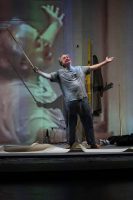
Paul Muldoon's long poem, an elegiac engagement with his former partner, the artist Mary Farl Powers who died at the age of 43 from breast cancer, is a beautiful piece of work. Intense, emotional and knotty, it offers up the best of poetic values – it is both intellectual and deeply moving. The poem has been produced by Jen Coppinger and Galway International Arts Festival as a cornerstone show for this year's festival. The result is a frustrating experience: there is brilliant writing in it, and the staging has lots of innovative ideas, but the work has not actually been transformed into a drama.
Paul Muldoon’s long poem, an elegy for former partner, artist Mary Farl Powers who died at the age of 43 from breast cancer, is beautiful.
Broadsides
Real Toads at the International Cryptozoology Museum
by Jacquelyn Ardam
The International Cryptozoology Museum is smaller than my apartment. It’s a big apartment, but it’s an even smaller museum. The museum is located in a red-brick former industrial building in Portland, Maine. It shares a wall with Big J’s Chicken Shack, and so the International Cryptozoology Museum — the only museum in the world dedicated to the study and promotion of cryptozoology — smells wonderfully, overwhelmingly, of fried chicken.
Andrew Motion on Stisted: ‘That’s where I first began to care about poems’
The former poet laureate on the village perched between Braintree and Halstead where his eyes were opened to the world
by Andrew Motion
“Fair seed-time had my soul,” says Wordsworth in the first book of The Prelude, “And I grew up / Foster’d alike by beauty and by fear.” Quite so. Beauty and fear. The essential, paradoxical ingredients of childhood. One filling us with wonder; the other threatening our hold on the world and hereby making it all the more precious. When Wordsworth wrote this phrase he was thinking about his birthplace – in Cockermouth, on the northern edge of the Lake District.
The International Cryptozoology Museum is smaller than a large apartment.
Drafts & Fragments
National Alzheimer's Poetry Project Introduced at Area Nursing Home to Enrich the Lives of Patients
by Erica Jones
Hope is a thing with feathers. And there’s plenty of hope flying around at Grace Lutheran Communities’ River Pines for long-term care, now that the national Alzheimer’s Poetry Project has been introduced. On Tuesday morning, 16 residents gathered in a circle along with several staff members while the founder of the Alzheimer’s Poetry Project, Gary Glazner, recited poems in a repeat-after-me format. “This is a poetry party,” Glazner said to the residents as the session began.
The National Alzheimer’s Poetry Project has been introduced at a nursing home in Pennsylvania.
Poetry In the News
British Students Paint Over Kipling Mural, Protesting ‘Racist Attitudes’

Deej Malik-Johnson, an elected representative at the University of Manchester’s students’ union, came into his office on Friday to find a poem painted on a wall opposite it. The poem, Rudyard Kipling’s “If,” is well-loved in Britain — it has been repeatedly voted the nation’s favorite — and is almost a pioneer of self-help writing. (“Keep your head when all about you/Are losing theirs and blaming it on you,” it advises.) It had been painted there by staff who manage the union’s building as part of a refurbishment. Mr. Malik-Johnson and his fellow student representatives were not happy.
British students have painted over a Kipling Mural, protesting the author’s racist attitudes.
New Books
We Live in the Newness of Small Differences by Sohini Basak
[Paperback] Eyewear Publishing. 80 pp., $15.70
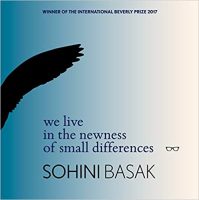
Sohini Basak's intricately woven, exquisite debut collection breaks boundaries with form and gently collapses reality, dream and folklore into each other. There is a sense of endlessness in the interactions of poems with each other and with their sources which range from Bangla children's classics to contemporary writers and ecological events. This is a collection that doesn't stand still, despite its elegance and charm, somehow continually recreating its own time and space beyond the page.
Flowers I Should've Thrown Away Yesterday by Elisa Matvejeva
[Paperback] Maida Vale Publishing, 80 pp. $13.95
This is an exciting debut collection from a young poet who is part of the Instapoet revolution, and a must have for all those fascinated by the medium. Elisa Matvejeva's powerful and shocking poems are combined with illustrations exploring love, hate, sex, abuse and passion. These poems explode from the page with their raw energy, taking the reader through a whirlwind of psychedelic landscapes on the way. The creativity and honesty of these will be an inspiration for many young readers and writers.
Superstition Freeway by Miles Waggener
[Paperback] The Word Works, 100 pp., $ 17.00
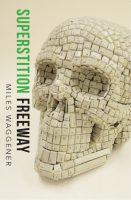
In lyrical hard-driving lines as layered and tonally complex as the desert itself, Waggener investigates our modern anxiety: the wastes and emptiness that cause it, the beauty and connection that rescue us from it. The smoky threat of Armageddon flavors the simplest of details here, yet the voice promises hope to even the most jaded post-modern reader. Says Susan Aizenberg, "'Retrace the paths. Name what / you can…' sings one of the luminous chorus of voices—obsessive, grieving, sometimes darkly funny—animating Miles Waggener's newest collection, and such is the soul-making work at the heart of these evocative, masterfully crafted lyrics.”
Living in Public by Uche Nduka
[Paperback] Writers' Collective of Kristiania, 180 pp., $16.00
In Nduka's Living in Public, the spheres of daily living, history, politics and love are not separated. In this book the sensual is sacred. The poetry is both understated and confrontational. Complacency is anathema to this long poem that passionately unfolds in an exploratory stylistic ambience. Living in Publicriffs on aesthetic and erotic sprightliness. This volume of poetry centers anger, joy and visionary intensity.
Lilith, but Dark by Nichole Perkins
[Paperback] Publishing Genius Press, 86 pp., $15.95
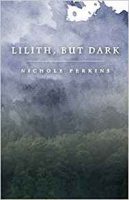
Lilith, but Dark reveals a series of confessions and penances, exploring a southern black woman's tour through lover's lament. It explores intimacies from home to the schoolyard to the bedroom. It is a journey through tornado alley, a search for power and peace in the eye of a southern storm.
Correspondences
Anne Waldman Takes on the Patriarchy One Poem at a Time
by Marie Scarles
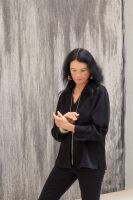
Anne Waldman is a giant in contemporary American poetry. Cofounder of the Jack Kerouac School of Disembodied Poetics at Naropa University and The Poetry Project at St. Mark’s Church in New York City, Waldman is the author of more than 40 books of poetry and collaborative texts. Her new book, Trickster Feminism, unites feminist history, Buddhist lore, contemporary politics, quantum physics, and more in a text of protest and upheaval. Her poems are layered, enchanting, and challenging, but if you’re willing to go along for the ride, their movements will unsettle your thinking on gender, feminism, and the political powers at large in the United States today. Tricycle spoke with Waldman about her book, mythological feminine figures, and political action.
Poet David Bottoms Goes Home Again to Canton with New Collection “Otherworld, Underworld, Prayer Porch”
by Cindy King
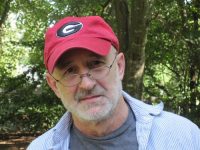
Georgia State University professor David Bottoms’ ninth poetry collection, Otherworld, Underworld, Prayer Porch, revisits some of the familiar subjects that first brought the Georgia native widespread acclaim in 1979, when his first collection, Shooting Rats at the Bibb County Dump, was selected by Robert Penn Warren as winner of the 1979 Walt Whitman Award. ArtsATL caught up with the poet to discuss the new book and his return to the subjects of his youth: his hometown of Canton, parents, memory, childhood and coming to terms with “ultimate things.”
Poet to Poet: An Interview with Mira Rosenthal
by Emily Wolahan
I’ve admired Mira Rosenthal’s translations of Tomasz Różycki for a while. Her engagement with form, as a translator and poet, stands out, too. Writing in form, particularly those that incorporate any rhyme, can feel as though it has a limited presence in contemporary American poetry, while it remains vital to many traditions. Translators that can take it on so successfully are truly appreciated. In this interview, we discuss sonnets, how to keep the music from “draining out” of an original poem, and the cooperative nature of all writing, including translation.
Experimental Poetry Press Closes Shop: An Interview with Burning Deck’s Rosmarie Waldrop
by Eric M. B. Becker

After fifty-six years, Burning Deck—one of the country’s most important experimental poetry presses—is closing up shop. We spoke with Rosmarie Waldrop, who cofounded the press with Keith Waldrop in 1961, about Burning Deck’s origins, the work of publishing poetry in translation, and the presses she feels will continue the work BD began. The press’s penultimate book, Elke Erb’s The Up and Down of Feet, translated from the German by Waldrop, was published last month and is reviewed in Words Without Borders.
After fifty-six years, Burning Deck—one of the country’s most important experimental poetry presses—is closing up shop.
Envoi: Editor’s Notes
Dead Horse in Field
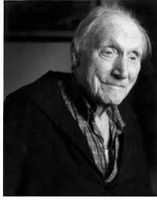
Above is an interview with David Bottoms whose first book, Shooting Rats at the Bibb County Dump, was selected for the Walt Whitman Award in 1979 by the preeminent American poet and novelist Robert Penn Warren. Thinking of the spirit of the living and the dead in the poetry of both men, I looked up some poems by Penn Warren to reacquaint myself with his work, which I remembered as a grad student finding penetrating for its struggle with the concept of time and of our place within it. Searching PoemHunter I found this, which is worth the read:
Dead Horse in Field
In the last, far field, half-buried
In barberry bushes red-fruited, the thoroughbred
Lies dead, left foreleg shattered below knee,
A .30-30 in heart. In distance,
I now see gorged crows rise ragged in wind. The day
After death I had gone for farewell, and the eyes
Were already gone—that
The beneficent work of crows. Eyes gone,
The two-year-old could, of course, more readily see
Down the track of pure and eternal darkness.
A week later I couldn’t get close. The sweet stink
Had begun. That damned wagon mudhole
Hidden by leaves as we galloped—I found it.
Spat on it. As a child would. Next day
The buzzards. How beautiful in air!—carving
The slow, concentric, downward pattern of vortex, wing-glint
On wing-glint. From the house,
Now with glasses, I see
The squabble and pushing, the waggle of wattle-red heads.
At evening I watch the buzzards, the crows,
Arise. They swing black in nature’s flow and perfection,
High in sad carmine of sunset. Forgiveness
Is not indicated. It is superfluous. They are
What they are.
How long before I go back to see
That intricate piece of
Modern sculpture, white now,
Assuming in stasis
New beauty! Then,
A year later, I’ll see
The green twine of vine, each leaf
Heart-shaped, soft as velvet, beginning
Its benediction.
It thinks it is God.
Can you think of some ground on which that may be gainsaid?
—RPW
A moving, thoughtful, and spiritual poem that wrestles with the natural world and what it means to be of nature, not only for the horse, obviously, but for the buzzards, crows, and the other creatures who do the work of tending to the dead as well as the speaker and his audience, and the removed owner (if not one and the same as the speaker) of the .30-30. So what made me grin was the note a fan had left in the comment section below the poem. They wrote in 2014:
"Robert, what a well written poem you have here"
I wonder if Penn Warren, who died in 1989 at the age of 84, would have seen the humor there. I think he would have.
"It thinks it is God."
Indeed.
“The day / After death I had gone for farewell, and the eyes / Were already gone—that / The beneficent work of crows” – Robert Penn Warren